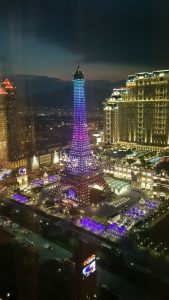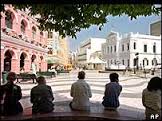 A Solution for Exchanges with Macau.
A Solution for Exchanges with Macau.
One of the realities of the global economy often overlooked by Macanese associations is the relationship between information and business.[1] Knowledge about business often comes in the form of information about local and international markets, individual sectors within those markets, data on commercial trends, news about technology, profiles of individual companies, and even contact information for potential partners. The fact that Macau’s history can be considered an economic asset because of its unique blending of European and Asian cultures should also be included.[2] A critical part of information gathering today is the ability to communicate directly with other business professionals across international borders. While mainland China is very involved in cross-border relations through its “One Belt, One Road” initiative, many associations in Macau remain isolated, despite wide use of the internet and numerous examples among expatriates throughout Southeast Asia.
Since the 1820’s, for example, Macanese printers in Canton, Macau, Hong Kong, and Shanghai created a model for the gathering and flow of information. According to researcher Hoi-to Wong, access to knowledge about China was an important part of an early information network for merchants and missionaries in Canton to communicate with counterparts in Europe and Asia.[3] The circulation of knowledge often took the form of government notices, pamphlets, books, newspapers, and periodicals, stimulating the growth of 19th century business, journalism, advertising, and political discourse.[4]
The growth of printed information provided a rich training ground for many Macanese who migrated to Hong Kong in the 1840’s and to Shanghai in the 1850’s. In these years, several enterprising printers opened their own firms, and pushed conventional boundaries by publishing government gazettes, creating product labels, bank notes, foreign language newspapers, and even printed and sold lottery tickets.[5] While remaining involved in Macau through different ventures, benevolent associations, and family ties, many printers employed family members and local residents in Fuzhou, Xiamen, Ningpo, and Hankou, and made up the majority of Macanese in each city well into the 20th century.[6]
One of the advantages of this large network was knowledge in printed materials stored in early company archives and libraries, and its influence on transactions involving international exports.[7] Such knowledge was often key to gaining advantages over competitors, either in business or in politics. Much of the information is still available today in printed and digital formats, indicating that the 19th century model of creating such networks may be applicable to 21st century commerce. The difference is that virtually an infinite amount of knowledge can now be preserved and transmitted instantaneously around the world.
 The Right Combination for Modern Times
The Right Combination for Modern Times
This combination of information, business, and culture can now be utilized by Macanese associations if they are to be involved in diversifying Macau’s economy. Using the resources of the internet, a method of employing a modern information network may well begin with the creation of an “International Business and Cultural Exchange Platform” (IBCEP). What would this involve ?
An IBCEP is an on-line business database and a cultural archive. It would allow, for example, Macau SME’s and international companies to access information about businesses in other countries, and to search for buyers and sellers of their respective products and services. The IBCEP would also provide cultural information about Macau that will serve as a local resource and help international visitors understand its unique history. This cultural element provides an economic advantage to Macau by providing historically accurate knowledge drawn from Chinese and international sources that will support tourism, the travel industry, and promote local hotels. At the very least, an IBCEP would provide user-friendly logistical information that can be used by travelers and potential business partners to increase cross-border exchanges. Individual features may include:
Specific information for Businesses:
- Information on Macau companies and international businesses, owners, and suppliers,
- Detailed information about their products, services, facilities, and capabilities
- Standard practices and procedures for Chinese and international companies,
- import and export service information for Chinese and international companies
- Specific information on trade policies, duties, and tariffs in different countries
- Logistics for shipping, including air, ground, and sea transport in all locations,
- Specific information about business environments in key international cities
- General market and sector trends around the world that could affect business
Cultural knowledge to encourage interest in Macau’s Unique History:
- Historical information about the origins of Macau and different ethnic communities
- Cultural information about Macanese families and communities related to business
- Specific locations through 3-D GPS mapping, including historic sites and landmarks
- Site information on language centers, cuisine, communities, and local neighborhoods
- An archive of historic photos, video of local activities, and interviews with principals
- Information on immigration, the local economy, banking, and visa requirements,
- Photos, video, and other media resources for cultural and commercial development
- Links to government resources in Macau, China, and other international cities
 Conclusion: Is there a Need for an IBCEP in Macau ?
Conclusion: Is there a Need for an IBCEP in Macau ?
The lack of reliable information to conduct business outside Macau, which is the key to diversifying the local economy, is evident by the limited exchanges between local companies and designated Portuguese speaking countries. Most contacts began in 2003 with the creation of the “Forum for the Promotion of Economic and Cultural Cooperation”, which attempts to use relations with the governments of Angola, Brazil, Cape Verde, East Timor, Guinea Bissau, Mozambique, Portugal, and Sao Tome/Principe to stimulate commercial projects. The results, however, have been limited due to a lack of local promotion, political unrest in some countries, and the depressed state of most economies.[8] Unlike Hong Kong, which does not confine relations to specific countries, Macau’s narrow focus on language-based contacts, a remnant of the 1999 handover to China, places it at a competitive disadvantage to neighbors like Zhuhai and Fujian in a global economy in which cultural differences are no longer an obstacle to conducting business.
One advantage Macau has overlooked are its widely dispersed expatriate communities in non-Portuguese speaking countries. Research published in 2011 by the Institute of Southeast Asian Studies in Singapore, and surveys in 2013 and 2014 conducted by the University of California Berkeley, indicate that over 1 million Luso-Asians who have traditional ties to Macau currently reside in at least 35 countries around the world.[9] Second and third generation members are now firmly entrenched in companies conducting business with China. Several individuals, based on recent interviews, are also CEO’s of their own firms and entrepreneurs who look to Macau as a potential gateway to China. Just as 16th century traders understood the unique character and strategic position of Macau in relation to China, modern players are now searching for information to make similar contacts.
The cultural advantages for business development are also evident. In 2004 Gary Ngai Mei Cheong, president of the Macau Association for the Promotion of Exchange between Asia-Pacific and Latin America (MAPEAL), wrote that it was crucial for Macau to retain its historical identity as a bridge to promote trade and cultural exchanges between China and the rest of the world.[10] One of the best methods is to preserve cultural materials, not only in Macau but in countries where Macanese communities developed. The Instituto Cultural is in the process of preserving local landmarks and historical sites. The Macau Foundation (Fundacao Macau) is also attempting to collect images, personal items, and documents related to this history. Unfortunately, as Dr. Helen Ieong of the Macau Memory Project learned recently, Macanese associations have been unable to gather information from communities abroad, nor have these associations been able to help Chinese officials attract business professionals among their expatriate members.
Clearly, there is a need for more information on international markets and potential business partners, given China’s mandate to diversity Macau’s economy. There is also a need to collect materials related to Macau’s history to promote its unique culture and support tourism. Once again, it is up to the leaders of Macanese associations to step forward with a plan. As an officer of one such association, I suggest that an on-line platform for international business and cultural exchanges would work well to begin the process.[11]
Notes:
[1] Most international contact with Macau has been filtered through twelve Macanese associations supported by the Conselho das Comunidades Macaenses (CCM), which was founded in 2000 and receives funding to hold meetings every three years, promote travel, and encourage commercial exchanges. The majority of members, which number about 10,000, tend to be retired with limited professional involvement in their respective countries. Based on recent interviews, there are at least ten other Macanese organizations world-wide that have not been recognized by CCM.
[2] Roy Eric Xavier, “Macau’s Culture as an Economic Asset”, Working Paper, Institute for the Study of Societal Issues, 2015 (https://www.academia.edu/18589314/Macaus_Culture_as_an_Economic_Asset)
[3] Hoi-to Wong, “Interport Printing Enterprise: Macanese Printing Networks in Chinese Trading Ports”, Bickers and Jackson, eds., Treaty Ports in Modern China: Law, Land and Power, Routledge, London, 2016: 139-157.
[4] Ibid, p.141
[5] Ibid, p.145.
[6] Ibid, p.143.
[7] Princeton University economists Wolfgang Keller, Ben Li, and Carol Shiue estimated that between 1868 and 1947 commercial activity in China grew 6.4% per year due to the expansion of different products from China. Keller, Li, and Shiue, “China’s Foreign Trade: Perspectives from the Past 150 Years”, 2010:23-4. Most of that growth through 1935 was in the export of such products as cotton and woolen goods, textiles, metals, wood products, machinery, sea products, dry foods, oils, sugar, teas, and tobacco. Hong Kong accounted for at least 25% of all imports and exports, with the rest scattered among the other “Treaty Ports”.
[8] Some of these sentiments were expressed in a 2010 article published in Macao Magazine. “… observers have said that, despite achievements in terms of trade and economic relations, local business people have been little involved in the process and the direct results of the forum have failed to meet expectations. Billy Ip Kuai Peng said that more attention needed to be paid to “how to strengthen market research and delivering and distributing information.” https://www.macaomagazine.net/politics/macao-china-and-portuguese-speaking-countries.
[9] Paulo Teodoro de Matos, ‘The Population of the Portuguese Estado da India, 1750 – 1820: Sources and Demographic Trends’, in Laura Jarnagin, ed., Portuguese and Luso-Asian Legacies in Southeast Asia, 1511– 2011, Vol. 1, p. 162. The surveys were conducted by my research group, The Portuguese and Macanese Studies Project, at the Institute for the Study of Societal Issues.
[10] Dr. Gary Ngai, “Macau Communities: Past, Present, and Future”, p. 113, published in Macau: Cultural Dialogue Towards a New Millenium, eds. Ieda Siqueira Wiarda and Lucy M. Cohen, Xlibris Corp. 2004.
[11] Dr. R.E. Xavier is a founding member of the Alianca Internacional Macaense (AIM-Macau).
More Stories
Studies of China’s GBA: U.S. – Chinese Interdependence after the Pandemic
Colonial Journalism in 19th Century Macau and Hong Kong
Women and Cultural Boundaries in Macau